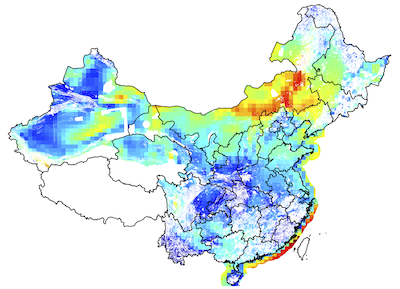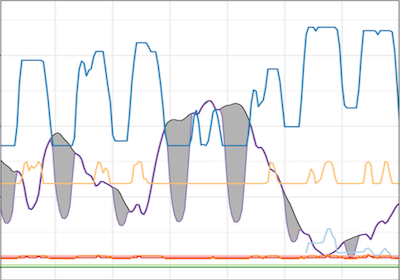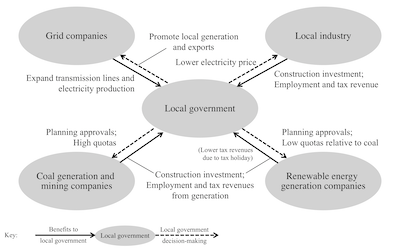The electric power system is the most complex, interconnected machine humans have ever created. It is an enormous feat to re-engineer this system in order to replace fossil fuels with low-carbon sources which have very different operational and stochastic properties. Electric power in every country is also imbued with complex governance and industrial structures, which are in general ill-suited to the new demands of low-carbon energy. Moving the needle on the environment requires tackling both sets of challenges.
My research broadly centers on three themes–and often at their intersection–of the institutional and engineering requirements for deploying low-carbon energy at scale. Current regions of focus include China, India, and the western U.S.
Renewable Resource Assessment and Planning for High-Penetration Futures
 Reaching high penetrations (>50%) of intermittent renewable energy will require careful assessment of resource quality, land use requirements, supporting infrastructure, and power system reliability. Meso-scale reanalysis models provide granular continental-scale datasets, which when combined with GIS layers can generate and rank infrastructure siting decisions. Work in this area focuses on validating errors in these datasets for power applications, and developing novel algorithmic combinations with expansion planning optimizations.
Reaching high penetrations (>50%) of intermittent renewable energy will require careful assessment of resource quality, land use requirements, supporting infrastructure, and power system reliability. Meso-scale reanalysis models provide granular continental-scale datasets, which when combined with GIS layers can generate and rank infrastructure siting decisions. Work in this area focuses on validating errors in these datasets for power applications, and developing novel algorithmic combinations with expansion planning optimizations.
Power System Operation Under Uncertainty and Heterogeneous Dispatch Paradigms
 Grid integration outcomes of renewable energy in practice depend on the interactions of uncertainty (e.g., forecast error) and the sequential nature of dispatching and scheduling decisions. Optimal configurations assuming perfect foresight are often insufficient in decarbonization research. Work in this area looks at the increasing use and complexity of energy markets and forecasting tools, developing new dispatch optimizations and solution techniques to capture large scenario and constraint spaces.
Grid integration outcomes of renewable energy in practice depend on the interactions of uncertainty (e.g., forecast error) and the sequential nature of dispatching and scheduling decisions. Optimal configurations assuming perfect foresight are often insufficient in decarbonization research. Work in this area looks at the increasing use and complexity of energy markets and forecasting tools, developing new dispatch optimizations and solution techniques to capture large scenario and constraint spaces.
Political Economy of Low-Carbon Infrastructure Innovation and Markets
 Electric power governance typically protects incumbent firms and preserves status quo institutions, and in general is ill-suited to the technical demands of a low-carbon energy system. With the falling cost of renewable energy, political barriers are becoming relatively more salient to the cost and pace of the transition. Work in this area includes deep case explorations of infrastructure management and innovation institutions, particularly in contexts with rapidly growing energy demands, and the political determinants of market efficiency.
Electric power governance typically protects incumbent firms and preserves status quo institutions, and in general is ill-suited to the technical demands of a low-carbon energy system. With the falling cost of renewable energy, political barriers are becoming relatively more salient to the cost and pace of the transition. Work in this area includes deep case explorations of infrastructure management and innovation institutions, particularly in contexts with rapidly growing energy demands, and the political determinants of market efficiency.